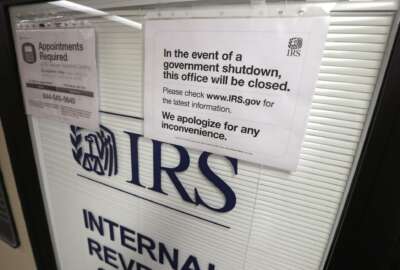To listen to the Federal Newscast on your phone or mobile device, subscribe on PodcastOne or Apple Podcasts. The best listening experience on desktop can be found using Chrome, Firefox or Safari.
- The White House wants agencies to cut at least one-third of all federal advisory committees by September 30. President Donald Trump signed an executive order last week directing these changes, alongside a list of the committees’ accomplishments. The order limits the number of committees to about 350, and also told agencies to develop a plan to terminate the committees by the end of August and include in their fiscal 2021 budget requests a list of statutory committees that Congress should ax. (White House)
- A 2016 law got one step closer to helping agencies expedite the sale of excess real property. The Public Buildings Review Board, created under the Federal Assets Sale Transfer Act, held its first meeting Monday. Acting Director Angela Styles says the board has six months to identify at least five federal civilian real properties, with an aggregate fair market value ranging from $500 to $750 million, to sell through an expedited sale and disposal process. The board will submit its recommendations to the Office of Management and Budget for review and approval. (Federal News Network)
- Almost 32% of the federal workforce is eligible to retire within the next five years. The Government Accountability Office says some agencies have especially high retirement eligibility rates. 45% of employees at the Department of Housing and Urban Development will soon be able to retire. 43% of employees at the Environmental Protection Agency, NASA and Small Business Administration are eligible to retire in five years. The Department of Homeland Security has the fewest number of retirement-eligible employees. (Government Accountability Office)
- The EPA launched a fall internship program, appealing to those with environmental aspirations. Dubbed Green Interns, the program is now accepting applications from recent science, engineering and public policy graduates, as well as veterans within two years of their discharge. Those chosen will start work September 30th. Interns will receive full federal benefits, including health insurance and participation in the TSP. EPA is using hiring authority under the Pathways Programs. After a year, interns are eligible to become permanent federal employees. (Environmental Protection Agency)
- The government would save about $7 million over the next decade if the Senate’s version of the 2020 defense authorization bill makes it into law. The Congressional Budget Office found the savings come from fees on new residents at the Armed Forces Retirement Home and payroll deduction from service members in the selected reserve of the U.S. Armed Forces. (Congressional Budget Office)
- The Defense Information Systems Agency said it’s cutting the rates it charges other government agencies for IT contracting services. DISA’s Defense Information Technology Contracting Organization will reduce the surcharge it adds to other DoD components’ contracts — from 2.5% to 2.25%. The change takes effect on Oct. 1, the beginning of the new fiscal year. It’s the first price reduction for DITCO’s services in the past five years. DoD regulations require DISA to charge agencies for the actual cost of its operations, and DISA says the price cut shows its contracting operations are becoming more efficient. (Defense Information Systems Agency)
- Senate appropriators are being called to give Customs and Border Protection supplemental funding. Over 70 law enforcement and industry groups told leadership on the Senate Appropriations Committee CBP has redeployed 731 officers from other ports of entry to staff up the southern border, impacting operations at those other locations. (National Treasury Employees Union)
- The Office of Special Counsel got another high-profile request for a Hatch Act investigation. Congressmen Don Beyer (D-Va.) and Ted Lieu (D-Calif.) have asked OSC to determine whether White House Senior Adviser Jared Kushner violated the law by participating in re-election fundraisers for President Donald Trump. The request comes a week after OSC recommended the president fire his counselor Kellyanne Conway. OSC found Conway had repeatedly violated the Hatch Act. (Rep. Don Beyer)
- The governmentwide security clearance backlog has reached its lowest point in three-to-four years. The National Background Investigations Bureau says the inventory is at 424,000 cases, which includes all types of investigations and extends across government and industry. NBIB Director Charlie Phalen attributed the progress to new technology, and an embrace of more modern investigative methods. The agency also hired more investigators, who are more productive and efficient now with more training under their belts. (Federal News Network)
- The General Services Administration released the second and much sought after piece of its IT services procurement known as COMET. The solicitation aims to create a multiple award blanket purchase agreement on top of IT schedule 70. GSA says it plans to make between 10 and 12 awards with at least 25% of them being set aside for small businesses. The BPA will ask vendors to provide a host of IT services, including operations and maintenance, cloud and the continued development and support of the acquisition systems portal called beta.SAM.gov. GSA plans to take a three-step approach to the evaluation of contractors, including an in-person technical challenge. In April, GSA issued the RFP for the first and much smaller part of COMET focused on architecture, engineering, and advisory support. (FedBizOpps)
Copyright
© 2024 Federal News Network. All rights reserved. This website is not intended for users located within the European Economic Area.





